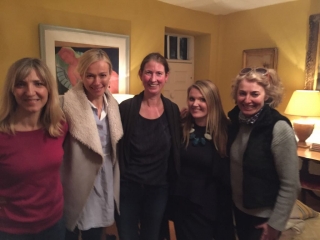Coaching The Venus Effect

We had talked at the European Barbershop Convention in October about working together, and I was eager to start before my big trip as there were some specific techniques I wanted to share that were the kinds of things that yield results by regular use. So the earlier we got them into their practice routines, the better.
The exercises were all focused on developing the ears, with the particular aim of increasing the clarity and consistency of the unit sound. The Venus Effect is a quartet who responds very strongly to musical narrative, so developing their lock and ring not only helps them in the dimension of technical control, but gives them whole new vistas of harmonic colour to explore.
As ever, if you want to develop the ears, duetting is going to be on the agenda. I came home from this session with two observations about the exercise that affirm its perennial value.
First, you can hear how the musicians grow through the duetting process not just in the quality of their singing, but in the increase in scope and detail of the feedback they gives each other. The Venus Effect started out with largely general comments, mostly focusing on vocal colour. But as we went on, the areas they covered gradually spread out to include, amongst other things, vowel matching, expressive shape, and opportunities to exploit the interaction between the lines. They also moved from describing what they were hearing to articulating what they wanted next.
Second, what a holistic exercise it is. Many exercises focus your attention on a specific skill or technique – such as the lock and ring and thought-point exercises we also worked on. This focus is what makes the exercises effective, of course, but it relies on someone making the diagnostic decision that that is what is needed right now. (Which is, of course, one of my main functions as a coach!)
Duetting, by contrast, is much more open. The whole point is for the ensemble to respond to the music and to each other, right here, right now. So it will never miss the mark, as its operation works entirely within the context of the current needs of both music and singers at that moment. And it will always continue to grow with the ensemble as the skills improve and needs become more sophisticated.
...found this helpful?
I provide this content free of charge, because I like to be helpful. If you have found it useful, you may wish to make a donation to the causes I support to say thank you.
Archive by date
- 2024 (17 posts)
- 2023 (51 posts)
- 2022 (51 posts)
- 2021 (58 posts)
- 2020 (80 posts)
- 2019 (63 posts)
- 2018 (76 posts)
- 2017 (84 posts)
- 2016 (85 posts)
- 2015 (88 posts)
- 2014 (92 posts)
- 2013 (97 posts)
- 2012 (127 posts)
- 2011 (120 posts)
- 2010 (117 posts)
- 2009 (154 posts)
- 2008 (10 posts)











